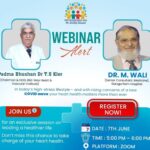“Lifestyle changes made at a younger age can improve heart health”
New Delhi, May 2, 2018:
A new study has warned that smoking and alcohol consumption increase the lifetime risk of a rapid and irregular heart rate, called atrial fibrillation. This can further lead to a stroke, dementia, heart failure, and other complications. It is important for people to be aware of atrial fibrillation especially because it is emerging as a global epidemic and poses considerable socioeconomic burden.
Under normal conditions, the heart contracts and relaxes to a regular beat. In atrial fibrillation, the upper chambers of the heart (the atria) beat irregularly (quiver) instead of beating effectively to move blood into the ventricles.
Speaking about this, Padma Shri Awardee Dr K K Aggarwal, President, Heart Care Foundation of India, said, “The process starting from receipt of blood in the atria till the end of pumping blood out of the ventricles is very well orchestrated and bought about by the electrical circuits encompassing the heart. Any lack of coordination in these events can lead to rhythm disturbances of the heart, and atrial fibrillation is one such rhythm disturbance. The risk is more in those who consume alcohol in plenty. In this condition, the atrial chambers contract irregularly at a rate of 400 to 600 times per minute. There is an impaired filling of the ventricles and stasis of blood in the cardiac chamber mainly in the left atria leading to clot formation. This clot can dislodge from the cardiac chamber and migrate to peripheral organs mainly the brain causing stroke.”
Some symptoms of atrial fibrillation include racing or pounding heart, excessive anxiety, sense of breathlessness, fatigue, lightheadedness, and syncope.
Over 40% of people who drink consume ≥5 standard drinks on a single occasion (binge drinking). “Holiday heart syndrome” is a common emergency department presentation, with AF precipitated by alcohol in 35% to 62% of cases.
Three large meta-analyses have demonstrated that moderate habitual consumption increases the incidence of AF in a dose-dependent manner with men and women equally affected. Alcohol consumption has been defined as: light (<7 standard drinks/week); moderate (7 to 21 standard drinks/week); and heavy (>21 standard drinks/week), where 1 standard drink is approximately 12 g of alcohol or 40 ml whisky.
Adding further, Dr Aggarwal, who is also the Group Editor of IJCP, said, “As with other conditions, the best way to manage your heart health is to make sure you see your doctor regularly and reduce the risks. Lifestyle changes made at a younger age can go a long way in preventing any damage to the heart. It is imperative to inculcate such habits right from the childhood. Elders can set an appropriate example by eating, drinking, and living healthy.”
Some tips from HCFI.
- Quit smoking and drinking as they are two major factors in causing damage to the heart.
- Manage your cholesterol levels as any imbalance in this can lead to a heart attack or stroke.
- Keep a check on vitals such as blood pressure and blood sugar. Any fluctuations in these can directly impact the heart in the longer term.
- Ensure that you get at least 30 minutes of physical activity every day.
- Achieve and maintain a healthy weight
- Eat a variety of healthy food including fruits, vegetables, and whole grains.







